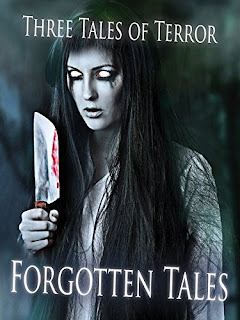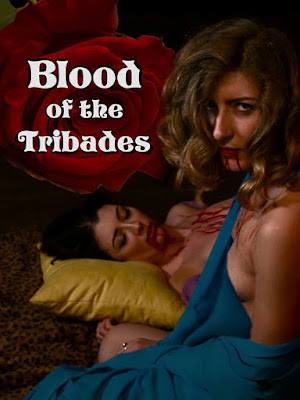Sophia Cacciola Interview
I quit posting to Bottom Shelf Film Reviews because I was not in a good place in my life. Trying to find a decent paying job with my degree didn't pan out and white collar office work is for those without souls. I lost interest in filmmaking and almost deleted all those half finished scripts I have typed on my hard drive. Now this wasn't hitting rock bottom and wondering if jumping in front of an 18 wheeler would solve my problems, that was 2007. This was that transition from my 20s to my 30s where I couldn't use my youthfulness as an excuse to for my shortcomings or that my ship was coming in. I wasn't the swinging bachelor I use to be and had two people that depended on me to be a lover, father, and provider. I swallowed my pride and quit trying to change what I had been for eleven years, a blue collared worker. I found a decent job at a small steel processing operation and then "the mill" called me back which was a blessing. I also told myself I would go back into filmmaking and give it my best shot.
Even though my stuff has mostly been YouTube work I do like try to reach out to the real artists that have made their mark in independent cinema. One of those artist was the very beautiful and extremely talented Sophia Cacciola who was gracious enough to answer my interview questions. Ms. Cacciola is behind such festival favorites as Blood of the Tribades, Ten, and Magnetic among other titles with her husband Michael J. Epstein. I really do appreciate the time that these artist have given to answer questions that not just me, but other aspiring filmmakers look for guidance on their future projects.
BSR So let’s start with an obvious question, when did you decide you wanted
to be a filmmaker?
SC I was in a lot of
bands back in Boston, and we worked with directors to do a couple of music
videos that ended up coming out really great and getting us a lot of attention.
We realized it was important to make more videos, but also that it was going to
be cost prohibitive to hire people each time for all of the jobs, so my partner
and I quickly realized that the best thing to do would be to buy a camera and
learn how to shoot and edit ourselves. Within a year or so, we were shooting
our first feature. So, it escalated quickly! But, I always had an interest in
visual narratives, I used to shoot plays and games for my high school (on VHS!
yay!), and I was into painting for a long time. As the technology and cameras
got cheaper and better, it became a lot more viable to just leap into making
movies. Not having to deal with DV or VHS and being able to film on DSLRs in
the beginning really made it accessible for me. We started heavy production
around 2010/2011.
BSR A lot of people work day jobs to keep the lights on at home and food on
the table, so how do you balance your passion which is filmmaking and your
professional life?
SC Professionally, I
freelance as a Cinematographer and Assistant Camera; which is great because it
keeps me on set and happy doing what I love! I also do some freelance web
design which works well as I’m able to do it on my own time and schedule in
between days on set. It is difficult to hold down any kind of job with specific
hours, even part time, because crew jobs and shoot opportunities very often pop
up at the last minute, and you’re expected to be available!
BSR Making your first feature what would obstacles did you faced as far as
production goes?
SC My first feature is
called TEN, and it’s a murder-mystery gone weird. We rented a mansion for eight
days and had the entire cast and crew (17 people) stay there. Since we only had
those limited days at that location, we basically just stayed awake the entire
time. We were working more than 20 hours a day, and we didn’t have enough help necessarily,
and it was just insane to get through. But, that was the experience that really
catapulted me into making movies, and I look back really fondly on that week at
the mansion and the friendships that were forged there.
BSR When did that dream come true for you personally that you were finally
recognized for your talents as a filmmaker?
SC It never really feels
like a complete process. I’ve gotten great encouragement from audiences, press,
and festivals, but I’m always thinking about the next thing and making a better
movie each time. So, I’m still growing and still learning and still pushing as
hard as I can! I am not sure if it will ever feel really complete.
BSR Your horror films tend to feature a lot of exploited material such as
gore and nudity. How do you make your
cast and crew feel comfortable with such elements?
SC I think everything
has to be approached with openness and compassion and wanting what’s best for
the movie and what’s best for each person. I start early in casting when
speaking with actors about the roles and what’s expected. I’m not going to
include gore and nudity unless there is a reason for it in what I’m trying to
say, so to me, it’s never gratuitous and I always explain to the actors exactly
why the scene is going to be included and exactly how it’s going to be shot. I
also expect an enthusiastic ‘yes’ when casting nudity. I never want someone who
is even a little bit unsure about it, because I don’t want to have any issues
on the day we shoot or with them regretting it later. I want them to be excited
and happy with how they are ultimately portrayed!
So, it’s enthusiastic
consent obtained through very detailed openness. We always try to make sure to
build and maintain trust with our casts and crews. It’s a very important part
of the process. The life-cycle of a movie is a few years (from production to
festivals to distribution) so it’s helpful to become friends with everyone!
When it comes time to shoot a difficult scene, I go over everything with the
actors. We sort through exactly how many people will be there and who they are
(and we often will limit that to the absolute bare-bones of cast/crew).
Everything is discussed in detail until everyone is comfortable enough to
proceed. That said, I have had very little difficulty finding people with
enthusiastic interest in being involved, especially after our first film was
out and people started to generally understand our artistic goals and our
creative process.
BSR What advice would you give someone that is wanting to just pull the
trigger and as Lloyd Kaufman says, “Make their own damn movie”?
SC Uncle Lloydie! Lloyd
has a multi-disc set for “Make Your Own Damn Movie,” and I watched that before
doing my first film, and I recommend it as a great place to start! But, yeah,
nothing is better than just leaping into it. Learn as much as you possibly can
(especially tech skills like camera and editing), make some friends who are
also interested (it’s so hard to make a movie alone) and just start shooting
and working on it. Don’t expect greatness within the first few projects, but
keep going, find your voice, and make magic. It’s all just hard work, but it’s
fun hard work!
So many people I know want to be filmmakers (or even call themselves filmmakers), but never make films. They are busy waiting for the “right” camera or the “right” actor or the “right” budget. It’s great advice to make the best movie you can make with what you can get access to. Then, do it again and again, but better each time.
BSR A lot of first time filmmakers get caught up with “movie moguls” such
as distributors at festivals that prey on said filmmakers to make a quick
buck. What advice would you give as a
heads up to a budding filmmaker?
SC Do your homework!
Check out the other movies that they represent. Make sure that you fit into
their roster. Read the contract and make sure you understand what rights you’re
signing away, for how long, and what your splits are. It’s also not outrageous
to try to contact some people who have worked with them to see if they
recommend them. Do the legwork, because once your movie is out, you don’t get a
do-over on the distribution. It’s also good to think about what they can
provide for you. If they are basically only putting it up on a couple of VOD
sites that are easy to get onto yourself and not planning on marketing it and
just taking 50%, then maybe think about self-distribution. Ask for advice.
Trust your instincts! Also, never expect unrealistic or longshot outcomes on
distribution or financial returns.
BSR What is your next project if you can share?
SC I’m currently in
post-production on my fourth feature, Clickbait. It’s a dark comedy/thriller
about two college-aged vloggers who are obsessed with staying on the
top-of-the-charts. I’m hoping to premiere it later this year! It’s my first
feature that I shot in Los Angeles (my previous three were shot in my previous
home of Boston), so it was a great experience to work with some new friends
I’ve made while working out here. I also have a witch film and a
post-apocalyptic astronaut movie that I’m trying to get up off the ground!
Hopefully I’ll be shooting one or the other later this year! All depends on
money and other resources. I’m also just beginning the editing process on a
documentary about Women in Film, based on oral histories that I have helped
film for the Women of Rock Oral History Project (http://womenofrock.org).
BSR Any advice you can give to a fresh filmmaker? Something you wish you knew before starting
your first production?
SC Make sure you are making the movie only you can make. Make sure you have something to say and that you are saying it proudly. Don’t just make a movie as an exercise. Make a movie because you need to tell the world something. Take constructive advice from people you trust, but don’t listen to people who tell you that you can’t or that your approach is wrong (and this will happen - especially from people who have never made a movie!), because you absolutely can! Find what you want to say, challenge accepted tropes, question societal norms. Art needs to light the tunnel.
SC Make sure you are making the movie only you can make. Make sure you have something to say and that you are saying it proudly. Don’t just make a movie as an exercise. Make a movie because you need to tell the world something. Take constructive advice from people you trust, but don’t listen to people who tell you that you can’t or that your approach is wrong (and this will happen - especially from people who have never made a movie!), because you absolutely can! Find what you want to say, challenge accepted tropes, question societal norms. Art needs to light the tunnel.
Websites:
Clickbait http://launchover.com/launch/film/clickbait/
Clickbait http://launchover.com/launch/film/clickbait/
Blood of the Tribades http://bloodofthetribades.com
MAGNETIC http://magneticthemovie.com
Launch Over: http://LaunchOver.com




Comments
Post a Comment